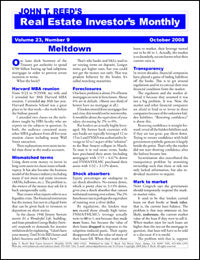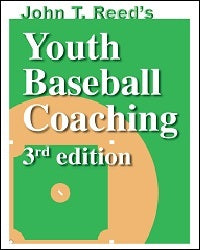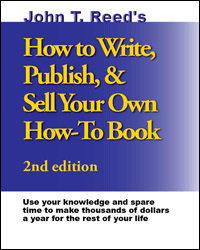Those who can, do. Those who can’t, write.
Posted by John Reed on
I often hear the comment, “Those who can, do. Those who can’t, write.” Or something like, “If this is such good advice, why aren’t you doing it instead of writing about it?” Or, “I only want to read stuff written by guys who are actively investing.”
These comments are generally made with much smugness, as if the speaker were the first to ask such a rhetorical question.
Although these comments seem logical, they are quite wrong. The correct version is that a how-to writer ought to have some pertinent experience, but current active investing is almost irrelevant. Actually, current investing has both advantages and disadvantages for an investment writer and his readers.
Advantages
The obvious advantage of current investing is that it gives you current experience with such changing things as the mortgage market, new laws, economic conditions, and so forth. But it does you no good regarding fundamentals of investing, management, tax laws that have not changed, and so forth. I invested from 1969 to 1992. I cannot think of a single thing that I have written about since 1992 that I got wrong because I was no longer active. If there was anything, it would fall under the category of nuance. I believe I have been able to write about changes quite adequately by reading about them or hearing about them from my readers and friends.
Now, if I had no experience in my past at all, that would be another matter. But the incremental benefit of a 24th year of experience after 23 years is negligible.
Disadvantages
When I was an active investor, I was queasy about writing about some subjects—like toxic substances, litigation, tenants rights, and so forth. Why? Because I owned buildings and my writing could be used against me in court.
Indeed, I got sued by a tenant once and the opposing attorney entered my How to Manage Residential Property for Maximum Cash Flow and Resale Value book into evidence as “Exhibit A,” literally. He also made me read into evidence in court passages that made me look bad when taken out of context. One was about using apartments to become a millionaire. Another told how I found I did not need my own light at a particular location because an illuminated billboard next door provided enough light. You get the idea.
On another occasion, I told subscribers to my newsletter that it was finally time to seek bargains in Texas.  I had previously said it was not yet time. I immediately was accused of trying to hype the value of my own two apartment complexes which were in Texas. I thought it was ridiculous to think that anyone could move real estate markets, let alone me.
I had previously said it was not yet time. I immediately was accused of trying to hype the value of my own two apartment complexes which were in Texas. I thought it was ridiculous to think that anyone could move real estate markets, let alone me.
Many financial periodicals and radio and TV programs have a strict ethical rule that says writers or on-camera personnel cannot comment on any investment category in which they have an interest. For example, a guy named Carter Randall who was a regular on Wall Street Week liked to point out that all his money was in real estate, thereby leaving him free to comment on the stock market without any fear it would hurt his own investments or appear as though he were trying to drive up the value of his own stocks.
As a non-investor, I now have no inhibitions about writing about any aspect of real estate investment. That benefit to my readers exceeds by far any value of current property-owning experience.
Tony Gwynn
I have a book called Youth Baseball Coaching.  It covers batting among other things. One of the greatest baseball batters of all time ,as Tony Gwynn. By the logic I started this article with, no one should pay the least attention to him on the subject of batting. Why? Because Gwynn retired and has not gotten a Major League hit in years. He died in 2014. But I still quote Gwynn in the book.
It covers batting among other things. One of the greatest baseball batters of all time ,as Tony Gwynn. By the logic I started this article with, no one should pay the least attention to him on the subject of batting. Why? Because Gwynn retired and has not gotten a Major League hit in years. He died in 2014. But I still quote Gwynn in the book.
True, Gwynn may have been somewhat out of date on new conditions after he retired, but he still was obviously a great one to listen to on the subject of hitting. If you said you were not interested in listening to anyone speak on hitting who was not currently batting over .300 in the Major Leagues—which would exclude guys like Willie Mays, Pete Rose, and Rod Carew—people would think you were an idiot.
‘If you’re so smart,…’
Another variation on this logic is, “If you’re smart, why aren’t you rich?” or “If you’re so smart, why aren’t you doing this instead of writing about it?” “Because I want other people to know how smart I am,” was one writer’s excellent answer.
Real estate investors—even successful ones—generally operate in obscurity. Most people crave recognition for their efforts. As a successful writer, you get tons of recognition. I get fan mail every day. I got about one fan letter every three years as a landlord (from happy tenants or others with whom I did business).
There’s no business like show business. Writing is show business. Being a landlord is not.
Writing skill
The “I’ll only read books by active investors” policy manifests great ignorance of how hard it is to write well. Few people in the real estate investment business are good writers. For you to define acceptable authors as those who are currently investing and good writers reduces the number of people whose books you will read to about zero.
Leigh Robinson is a good writer who is also actively investing, but his books are about apartment management. His current investments are mobilehome parks, motels, and a miniwarehouse. He refuses to write about any of those types of investments because the market for such books would be too small.
Les Scher writes well. I do not know if he is actively buying property.
John Schaub is a decent writer and a good speaker and I believe he is still an active investor.
Many who would like to write, try, and find they cannot write readable writing. Seems easy to me, but I have seen some really awful stuff.
That’s about it among the guys I know who are both good writers and actively investing. So if you have that policy, you can only buy their books. That’s one of the big flaws in this way of thinking. The people who espouse it are ignorant of the number of good writers who are also active investors. They assume there are hundreds of good writers to choose from. In fact, there are only a handful.
Liking writing
I like writing. I write the equivalent of several term papers a day. To most people, that would be agony. They don’t like to write. Many hate writing. Virtually all active real estate investors fall into that category.
Won’t write
Many of the active, successful investors whom these consumers would read are unwilling to write about investing. Why? They don’t want to reveal their hard-won secrets because they fear it would increase their competition and thereby drive down their return and income per hour.
Research
Good nonfiction or how-to writing requires research. For example, federal income tax law is important to real estate investors. To keep up on it, I subscribe to three tax law periodicals. When a new law or court decision or regulation or ruling or revenue procedure comes out, I have to get hold of a copy to read and analyze it.
Carleton Sheets has a very big guru business. He used to have a booklet on income tax laws related to real estate in his package. I reviewed it and ripped it to shreds because it was all fouled up. I have since been told that he removed it from the package and has not replaced it with a correct version. I'll take that as an admission that my criticism was correct and has Sheets running up the white flag on his claim that he can be an active investor and a big-time guru who knows what he is talking about—at least on income taxes.
Also Sheets insisted to me that he was currently active and buying or selling at least weekly. I then asked for a list of the properties he had bought or sold in the last 90 days. Silence. He told me he bought a nothing-down house the week before. I asked for the address and lender name. Silence.
A lot of real estate investment gurus say they are active investors. Show us the addresses. They won’t do it.
I also read all sorts of business and real estate books and periodicals to keep up. That all takes part of my 24 hours.
Guru business
There is also the fact that the guru business itself takes an enormous amount of time. All I do are books and a newsletter. I do no paid speeches or consulting or “mentoring.”
With any guru business, there is a great deal of behind-the-scenes work to be done. I have to get bids on printing, proof printing jobs, correct problems with the printing. I have to maintain this Web site. The more customers you have, the more customer service problems you have: non-delivery, address changes, and so forth. It all takes time. The other gurus are arranging studio time to record infomercials, dealing with personnel issues, etc.
Ignorant laymen may think that a big shot success would have people to do that for him. Some do. I don’t. The reason is that when you have people, you have to spend almost all of your time hiring, training, retaining, and firing people. I’ve been there and done that. I prefer to spend my time writing.
At present, three of my books are out of print. I don’t have time to clean them up, get them to the printer, and start selling them again. I turn away money from people who want to buy them daily. How many books would I have out of print if I started investing again?
Liars
There are a whole bunch of liars who claim to be active investors as well as gurus. But they won’t give you any addresses of the properties they are supposedly buying and selling. They know that many only want to buy information from such people, so they encourage that notion and claim to fit the bill. In fact, they almost certainly do not actively invest or just do so in a perfunctory way so they can accurately say they do. Dave Del Dotto used to buy dozens of cheap, abandoned vacation lots in remote western areas, apparently so he could claim to have bought many properties in the last year as he was touting his books and tapes.
24 hours in a day
As I noted in my real estate investment B.S. Artist Detection Checklist, gurus only have 24 hours in their day, same as you and I. That’s too few to operate both a guru business and an active real-estate investing business. For example, it takes 4.6 hours per unit per month to do the resident manager and property manager duties on a residential property. The more units the guru has, the fewer hours are left for writing and such. The late Paul Thompson was a professional foreclosures buyer. He calculated that it took him 165 hours of work for each property he acquired. When a guru says or implies he has this many units or does that many deals a year, multiply his figure by the above numbers and see how much of his 24-hour day he is devoting to investment activities. Invariably, you’ll find there are not enough hours in the day for him to be doing all that he claims to be doing.
The proper criteria you should have for whose books to read is some experience and good advice. Ask experienced investors whom to read. They recognize good advice when they see it. When you pontificate that you only read books by active investors, you just reveal your ignorance of the real estate investment book business. The only people whom you claim to read do not exist.
Sports coaches
Arguably the best NFL coach today is Bill Bellichick of the Patriots. His playing career? Wesleyan College, a Division III school in Connecticut. They tried to recruit my son. We visited but turned them down. My son ended up playing a Ivy League Columbia, far below NFL.
Diamondback Baseball General Manager Tony Larussa, who is in the same homeowners association as I am, is in the Hall of Fame for his managing. HE was a player for about nine years but only batted .199, got 35 career hits and 7 RBIs.
The star pitching coach in the 3/26/15 Sport Illustrated article on 2015’s great pitching coaches was an also-run pitcher at Kearney State College. The star hitting coach in the same issue article on current great hitting coaches is Bam Bam Muelens, a flop as a MLB player whose basic teaching now is don’t be like I was when I played.
The fact is coaching and teaching are not the same as playing or doing—for a bunch of reasons. Some successful coaches have had no experience. For example Mike Leach was a rugby player before becoming a star college football coach. Charlie Weis was a big success coaching the offense for Bill Bellichick at the Patriots, but never played football at all, or rugby or anything else. There are also many examples of great players flopping as coaches.
Coaches, teachers, and how-to writers need to be judged on their success at coaching, teaching, and helping their readers. I think it’s probably true that the best at coaching, teaching, and how-to writing would probably do better doing their coaching/teaching/writing thing in a whole new area, say, badminton, than the best badminton player ever. Coaching/teaching/writing is about figuring out what works and helping the average guy apply those best practices. Playing and other largely about using your talent, and knowing one position—almost an entirely different mindset.
Share this post
0 comment

